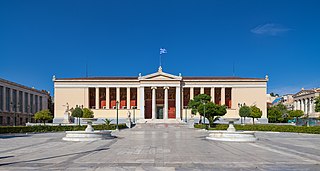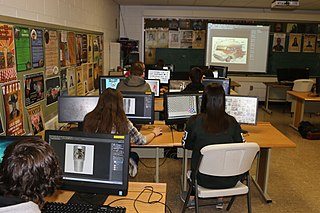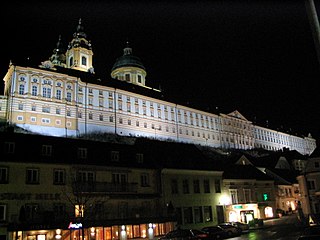Related Research Articles

Gymnasium is a term in various European languages for a secondary school that prepares students for higher education at a university. It is comparable to the US English term preparatory high school. Before the 20th century, the gymnasium system was a widespread feature of educational systems throughout many European countries.
Abitur, often shortened colloquially to Abi, is a qualification granted at the end of secondary education in Germany. It is conferred on students who pass their final exams at the end of ISCED 3, usually after twelve or thirteen years of schooling. In German, the term Abitur has roots in the archaic word Abiturium, which in turn was derived from the Latin abiturus.

Education in Germany is primarily the responsibility of individual German states, with the federal government only playing a minor role.
Education in Slovakia consists of a free education system based on 10 years of compulsory school attendance.

Education in Greece is centralized and governed by the Ministry of Education and Religious Affairs at all grade levels in elementary and middle school. The Ministry exercises control over public schools, formulates and implements legislation, administers the budget, coordinates national level university entrance examinations, sets up the national curriculum, appoints public school teaching staff, and coordinates other services.

A state school or public school is a primary or secondary school that educates all students without charge. Such schools are funded in whole or in part by taxation.
Education in the Republic of Ireland is a primary, secondary and higher education. In recent years further education has grown immensely with 51% of working age adults having completed higher education by 2020. Growth in the economy since the 1960s has driven much of the change in the education system. For universities there are student service fees, which students are required to pay on registration, to cover examinations, insurance and registration costs.
Secondary education in Denmark usually takes two to four years and is attended by students between the ages of 15 and 19, after finish primary education by 9th or 10th grade. Secondary education is not compulsory, but usually free of charge, and students have a wide range of programmes to choose from. Some education programmes are oriented towards higher education, the most common being the Gymnasium. Others are more practically orientated, training students for jobs such as artisans or clerks through a combination of instruction in vocational schools and apprenticeship.
In Denmark, the Higher Technical Examination Programme is a 3-year vocationally oriented general upper secondary programme which builds on the 10th-11th form of the Folkeskole. It leads to the higher technical examination, the HTX-examination, which permits a student to qualify for admission to higher education, subject to the special entrance regulations that apply to the individual course. The programme gives special attention to scientific, technical and communicative subjects. HTX graduates may study at any Danish technical, scientific or traditional university as well as technical and technological academy (akademi) or college (professionshøjskole).
Tenth grade is the tenth year of formal or compulsory education. It is typically the second year of high school. In many parts of the world, students in tenth grade are usually 15 or 16 years of age.

Twelfth grade is the twelfth year of formal or compulsory education. It is typically the final year of secondary school and K–12 in most parts of the world. Students in twelfth grade are usually 17–18 years old. Some countries have a thirteenth grade, while other countries do not have a 12th grade/year at all.

The Republic of Austria has a free and public school system, and nine years of education are mandatory. Schools offer a series of vocational-technical and university preparatory tracks involving one to four additional years of education beyond the minimum mandatory level. The legal basis for primary and secondary education in Austria is the School Act of 1962. The Federal Ministry of Education is responsible for funding and supervising primary, secondary, and, since 2000, also tertiary education. Primary and secondary education is administered on the state level by the authorities of the respective states.

The educational system in Hungary is predominantly public, run by the Ministry of Human Resources. Preschool kindergarten education is compulsory and provided for all children between three and six years old, after which school attendance is also compulsory until age of sixteen. Primary education usually lasts for eight years. Secondary education includes three traditional types of schools focused on different academic levels: the Gymnasium enrols the most gifted children and prepares students for university studies; the secondary vocational schools for intermediate students lasts four years and the technical school prepares pupils for vocational education and the world of work. The system is partly flexible and bridges exist, graduates from a vocational school can achieve a two years program to have access to vocational higher education for instance. The Trends in International Mathematics and Science Study (TIMSS) rated 13–14-year-old pupils in Hungary among the best in the world for maths and science.

A Hauptschule is a secondary school in Germany, starting after four years of elementary schooling (Grundschule), which offers Lower Secondary Education according to the International Standard Classification of Education. Any student who attends a German elementary school can go to a Hauptschule or Gesamtschule, while students who want to attend a Realschule or Gymnasium need to have good marks in order to do so. The students spend five to six years at the Hauptschule, from 5th to 9th grade. They finish around age 15 to 17.
A school leaving qualification is an academic qualification awarded for the completion of secondary education. Depending on the country or region, it may alternatively be known as a high school diploma, senior secondary leaving certificate, high schools general certificate or school certificate.

Gymnasium, in the German education system, is the most advanced and highest of the three types of German secondary schools, the others being Hauptschule (lowest) and Realschule (middle). Gymnasium strongly emphasizes academic learning, comparable to the British sixth form system or with prep schools in the United States. A student attending Gymnasium is called a Gymnasiast. In 2009/10 there were 3,094 gymnasia in Germany, with c. 2,475,000 students, resulting in an average student number of 800 students per school.

A Höhere Technische Lehranstalt, commonly known as HTL, is an engineering-focused secondary school/institution of further education in Austria. As an umbrella term it is used for either
The first documented school in Lithuania was established in 1387 at Vilnius Cathedral. The school network was influenced by the Christianization of Lithuania. Several types of schools were present in medieval Lithuania – cathedral schools, where pupils were prepared for priesthood; parish schools, offering elementary education; and home schools dedicated to educating the children of the Lithuanian nobility. Before Vilnius University was established in 1579, Lithuanians seeking higher education attended universities in foreign cities, including Kraków, Prague, and Leipzig, among others. During the Interbellum a national university – Vytautas Magnus University was founded in Kaunas.
A Kolleg in Germany is a three-year school of adult education, preparing students for the exams leading to the general university entrance qualification, the Abitur .
References
- ↑ "Voraussetzungen". Abendgymnasium Frankfurt am Main (in German). Retrieved 2023-12-15.
- ↑ "Abitur nachholen an der Abendschule und Abendgymnasium". www.abitur-nachholen.org. Retrieved 2023-12-15.
- ↑ "Kostenfreiheit". Abendgymnasium Frankfurt am Main (in German). Retrieved 2023-12-15.
- ↑ "Abendgymnasium – Abendgymnasium Wien" (in German). Retrieved 2024-02-23.
- ↑ "Abendgymnasium – Abendgymnasium Wien" (in German). Retrieved 2024-02-23.
- ↑ "Abendgymnasium – Abendgymnasium Salzburg" (in German). Retrieved 2024-02-23.
- ↑ "Abendgymnasium – Abendschule Kassel" (in German). Retrieved 2023-12-15.